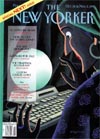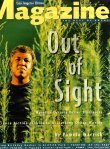SF Reviews and Articles in General Publications
Salon, Monday Oct. 26th
David Hudson reviews James Flint's Habitus (Fourth Estate -- published so far only in the UK), ''an unabashedly postmodern science fiction novel, drenched in theory, but with all the biting humor of Martin Amis.''

Los Angeles Times, Sunday Oct. 25th
Lucretia Stewart reviews Walter Mosley's Blue Light, which she finds as disappointing for fans of the author as songs written under the influence of Philip Glass would be to Bruce Springsteen fans. The book follows several unappealing characters in the mid-1960s after a cosmic blue light imbues people with various supernatural powers. The reviewer concludes ''I have never understood why the future (and this, despite its 1960s setting--when the human race apparently began--is a futuristic vision) is almost always portrayed as unremittingly bleak. I guess that it's because we know that human beings, ever since the Garden of Eden and subsequent Fall, tend to the bad. It's a shame when a writer like Mosley feels compelled to do the same.'' [Locus will review this book in its November issue.]
Boston Globe, Friday Oct. 23rd
William A. Davis reviews Phil Patton's Dreamland.
(Mon 26 Oct 98)
New York Times, Monday Oct. 26th
Edward Rothstein writes about the appeal of Robert Jordan's ''Wheel of Time'' fantasy series: An Adored Fantasy Series Now Hints at 1990's Angst. Jordan's latest volume, The Path of Daggers, is now in stores.
Los Angeles Times, Sunday Oct. 25th
The paper's Life & Style section, building towards Halloween, publishes several vignettes by local writers all beginning with the classic starting line ''It was a dark and stormy night...'' (This link will work for a day or two until these items are $archived.) Among the contributions are Dennis Etchison's ''Last Writes'', Richard Laymon's ''Hotfoot'', and William F. Nolan's ''Ray, Is That You?''.
The Independent, Oct. 22nd
The British newspaper ran an essay by anthologist and writer Stephen Jones, ''A Thought for Halloween'', subtitled ''Horror Fiction Is About More than Monsters''. (Not available on the web.) Jones describes the familiar dinner party scenario in which other guests react uncomfortably to the news that he writes and edits horror books. ''If all the conversation around the table doesn't actually stop, then certainly a few people glance over in a peculiar fashion, as if they have just discovered that they are sharing their personal space with a serial killer or child pornographer.''
Ironically, Jones writes, the handful of horror writers most people have heard of -- King, Barker, Koontz --have merged into the amorphous mainstream as far as publishers are concerned.
But despite the wails of doom and gloom, the field continues to thrive and
grow. You have only to look at the recent success of the Scream movies or
the young adult "Goosebumps" series. And while publishers on both sides of
the Atlantic persist in culling their horror lines (usually at the expense
of new writers and mid-list titles), so the small, independent presses have
stepped in to fill the void, and this is where some of the most interesting
and cutting-edge work is now appearing.
An interview with Jones is scheduled to appear in the London Evening Standard newspaper on Friday, October 30th.
(Mon 26 Oct 98)
Salon, Thursday Oct. 22nd
Reviewer Mary Elizabeth Williams doesn't think much of Anne Rice's The Vampire Armand. ''Ultimately, though, it is title character Armand who is the book's biggest draw and its weakest link. The sad, beautiful youth, so mesmerizing in previous glimpses, is all tapped out here. The best parts of his story have already been revealed in Rice's earlier novels.''
(Fri 23 Oct 98)
 The New Yorker, Oct. 26 & Nov. 2, 1998
The New Yorker, Oct. 26 & Nov. 2, 1998
A special 'Next!' issue with lots of good stuff:
An article about SpaceDev, a commercial space exploration company ready to mine the asteroids and launch scientific probes, for less than NASA's prices.
A column about Matt Groening's new TV series Futurama, with a big color illustration.
A short story by Martin Amis, ''The Janitor on Mars''.
An article by Amitav Ghosh [Arthur C. Clarke Award winner for The Calcutta Chromosome] about countries in southeast Asia building atomic bombs. (Excerpted online.)
Talk of the Town pieces about Ulysses, most unread novel of the 20th century; and Salman Rushdie.
A Steve Martin [humor] piece about bizarre legal rulings affecting concepts of causality, such as a Sacramento judge's recent ruling that pi equals 2.9.
A photo of Al and Tipper Gore dressed up as Frankenstein's monster and his bride, at a Halloween party in 1994. (Page 166)
A review of John Maddox's What Remains to Be Discovered.
The New York Times, Wednesday Oct. 21st
Five Questions With Stephen King -- 5 3/4 actually -- includes King's explanation of the bladder factor in the success of his movies.
USA Today, Tuesday Oct. 13th
A profile of Harry Turtledove is accompanied by an article about alternate history fiction. The piece quotes publicists at Morrow and Del Rey, authors Harry Harrison and Steve Stirling, Uchronia webmaster Robert Schmunk, and
''alternate-history author and scholar'' Gardner Dozois.
(Fri 23 Oct 98)
 Salon, Wednesday Oct. 21st
Salon, Wednesday Oct. 21st
Scott McLemee reviews Bryan Cholfin's anthology The Best of Crank! (Tor). Cholfin's complaints about the conservatism of much current SF echo battles of the '60s New Wave, McLemee notes. Of the stories, the reviewer singles out those by Le Guin and Bishop for praise.
Village Voice Literary Supplement, October 1998
Erik Davis [author of the just-published TechGnosis: Myth, Magic, and Religion in the Information Age] reviews Lawrence M. Krauss's The Physics of Star Trek and its spawn: he admires Richard Hanley's The Metaphysics of Star Trek (aka in trade paper Is Data Human?), pans Robert Sekuler and Randolph Blake's Star Trek on the Brain: Alien Minds, Human Minds and Susan and Robert Jenkins' Life Signs: The Biology of Star Trek, and finds the balanced tone of Athena Andreadis's To Seek Out New Life: The Biology of Star Trek just right.
Varley reviewed online
Not in 'general publications' but worth linking: reviews of John Varley's The Golden Globe by Paul J. McAuley on SF Site, and by John Clute on Science Fiction Weekly.
(Wed 21 Oct 98)

Washington Post Book World, Sunday Oct. 18th
Anne Rice resumes her Vampire Chronicles with The Vampire Armand, reviewed by Kevin Allman, who's impressed by the author's power of recovery. ''Rice's voluptuary world view [is] the main attraction. Not many writers can shift from ruminations on Christianity into casual homoeroticism without stripping their gears, but Rice does it with ease. Elegant narrative has always been her hallmark; she glops on juicy, rococo descriptions as if they were scoops of whipped cream. And her talent for describing Gothic interiors down to the last bibelot and objet d'art makes her the Martha Stewart of the Charles Addams set.''
Elizabeth Hand reviews William Browning Spencer's Irrational Fears. She asks ''Does the world really need another Time Travel Alternate World Evil Cult Cthulhu Mythos novel set within the frayed-soul province of Alcoholics Anonymous? Does the world need even one?'' Answer: Yes.
Also: a review by John Crowley of Lorraine Daston and Katherine Park's Wonders and the Order of Nature 1150-1750, a ''large, handsome and endlessly intriguing book''
about how ''two complementary impulses, curiosity and wonder, changed (and sometimes swapped) meanings, moral worth, objects and consequences over the course of eight or 10 centuries''.
 The New York Times Book Review, Sunday Oct. 18th
The New York Times Book Review, Sunday Oct. 18th
The Children's Books section examines two new editions of Mary Shelley's Frankenstein: this unabridged edition published by Viking and illustrated by Philippe Munch; and this edition adapted and illustrated by Chris Mould and published by Oxford University Press.
(Mon 19 Oct 98)
 Los Angeles Times Magazine, Oct. 18, 1998
Los Angeles Times Magazine, Oct. 18, 1998
Octavia Butler is profiled in a cover feature by Pamela Warrick: ''Novelist Octavia Butler transports science fiction junkies to disturbing other worlds'' reads the cover blurb. (This link may work for a while.) Butler lives in the San Gabriel Valley, a suburban area near Los Angeles, in a house she bought for herself and her mother after winning a $295,000 MacArthur Foundation 'genius grant' in 1995. Since her mother's death in 1996, Butler has written her first book on a computer, Parable of the Talents, due next month from Seven Stories Press.
(The article gets credit for avoiding the abbreviation ''sci-fi'' and for not distancing its subject from the genre, but it does contain this curious passage: ''[L]egions of fans know her as one of the preeminent authors in her field, a genre the Library of Congress classifies as science fiction but which most other current practitioners call 'fantastic realism.' '')
(Mon 19 Oct 98)

The New York Times Book Review, Sunday Oct. 4th
Gerald Jonas's SF column covers Joan Slonczewski's The Children Star, Wil McCarthy's Bloom, Robert Silverberg's The Alien Years, and Elizabeth Hand's Last Summer at Mars Hill. Jonas seems most enthusiastic about Hand: ''For Elizabeth Hand, magic is a reflection of the human heart; as the title story poignantly implies, death itself can be thought of as a failure of the imagination.''
Washington Post Book World, Sunday Oct. 11th
Michael Dirda reviews and appreciates The Avram Davidson Treasury.
Washington Post Book World, Sunday Oct. 4th
Gregory Feeley's SF and Fantasy column covers Bryan Cholfin's The Best of Crank! (Tor), with close looks at stories by Le Guin and Fintushel; Frederick Pollack's ''novel in verse'' Happiness (Story Line), and Wil McCarthy's Bloom (Del Rey)
Los Angeles Times, Friday Oct. 9th
If you haven't heard enough yet about Stephen King and his new book, here's a feature article about him on the occasion of his visit to the set of Warner Hollywood Studios' production of The Green Mile, starring Tom Hanks.
San Francisco Chronicle, Sunday Oct. 11th
Carey Harrison reviews Iain Banks's A Song of Stone: ''Banks' many readers know that every one of his books is a feast, and those new to this author should not miss a chance to discover him in 'A Song of Stone.' Tranquil, hypnotic observation amid horror is Banks' calling card, exhibited here to the full.'' But the reviewer does have a problem with the book to the extent that it resembles science fiction:
If the novel has a drawback, it is the
characteristically Banksian one of its independence
from history. His writing eagerly depicts a kind of
island in space and time, and it's no accident that
''Iain M. Banks,'' the name under which Iain Banks
writes science fiction, is a name so close to his
own, barely a pseudonym at all.
Here's the rub: Adventure stories set in an
imaginary country slide easily into the stereotypical.
Shorn of history's true accidents, ''A Song of
Stone's'' anywhere-land offers its readers sanctuary
-- one that many science fiction fans cherish -- from
the shifting vocabulary of the real.
San Francisco Chronicle
An Oct. 4th review of Mike Davis's Ecology of Fear, and a Sept. 27th review (that quotes J. G. Ballard) of Phil Patton's Dreamland, two books noted by Locus Online's Reality Checks.
USA Today, Sept. 23rd
A brief review by Tish Wells of Robert Silverberg's fantasy anthology Legends.
(Mon 12 Oct 98)
 Entertainment Weekly, Oct. 16, 1998
Entertainment Weekly, Oct. 16, 1998
The magazine's special ''Sci-Fi'' issue lists the 100 all-time best works of science fiction: 61 movies, 14 TV productions, 15 books, and 9 assorted others including comics, games, and a magazine (Amazing Stories in 19th place). The selections are not uninformed and cannily recognize the extent to which SF's impact on popular culture has been through visual media. Number 1: Star Wars. Number 2: Star Trek. Number 3: The Twilight Zone. Number 4: Frankenstein (the book). Number 5: 2001: A Space Odyssey. The books on the list:
4. Frankenstein (Shelley)
13. Nineteen Eighty-Four (Orwell)
15. The Time Machine (Wells)
21. I, Robot (Asimov)
24. Brave New World (Huxley)
31. Stranger In a Strange Land (Heinlein)
34. Neuromancer (Gibson)
43. The Martian Chronicles (Bradbury)
49. From the Earth to the Moon (Verne)
50. Slaughterhouse Five (Vonnegut)
51. Fahrenheit 451 (Bradbury)
59. Dangerous Visions (Ellison, editor)
71. The Female Man (Russ)
83. Dune (Herbert)
91. The Hitchiker's Guide to the Galaxy (Adams)
The EW website gives the feature's introduction, descriptions of the Top 10 selections, and the complete Top 100 list.
(Mon 12 Oct 98)
Previous Field Inspections





 The New Yorker, Oct. 26 & Nov. 2, 1998
The New Yorker, Oct. 26 & Nov. 2, 1998 Salon, Wednesday Oct. 21st
Salon, Wednesday Oct. 21st The New York Times Book Review, Sunday Oct. 18th
The New York Times Book Review, Sunday Oct. 18th Los Angeles Times Magazine, Oct. 18, 1998
Los Angeles Times Magazine, Oct. 18, 1998 Entertainment Weekly, Oct. 16, 1998
Entertainment Weekly, Oct. 16, 1998